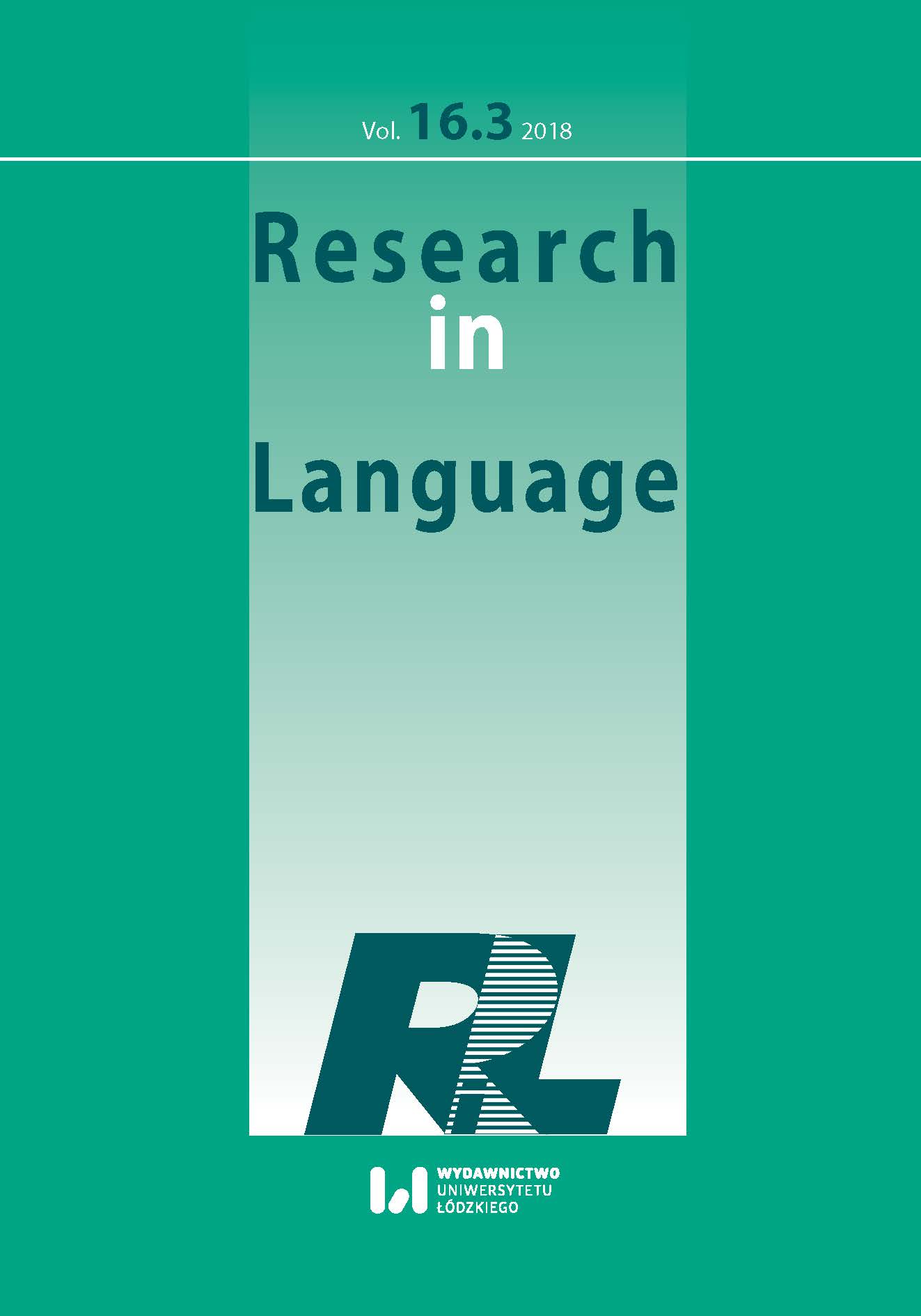Expert-Like Use of Hedges and Boosters in Research Articles Written by Polish and English Native-Speaker Writers
DOI:
https://doi.org/10.2478/rela-2018-0013Keywords:
booster, corpus, hedge, metadiscourse, research article, writing for publicationAbstract
The present study compares the use of main interpersonal metadiscourse markers - hedges and boosters - in a corpus of 40 research articles from the area of applied linguistics, written in English by native speakers and Polish writers. Used as communicative strategies, these words and expressions increase (boosters) or reduce (hedges) the force of arguments. In order to gain an in-depth insight and to achieve greater precision, in the analysis the author utilizes a concordance tool WordSmith 6.0 (Scott 2012). The results point to important discrepancies in the usage of these text features by authors representing different native languages and cultures. The study has important implications for developing competence in writing for publication in English as a Foreign Language.
References
Abdollahzadeh, Esmaeel. 2011. Poring over the Findings. Interpersonal Authorial Engagement in Applied Linguistics Papers. Journal of Pragmatics 43. 288-297.
Google Scholar
American Psychological Association. 2010. Publication Manual of the American Psychological Association (6th ed.). Washington DC: Author.
Google Scholar
Ӓdel, Annelie. 2006. Metadiscourse in L1 and L2 English. Amsterdam: John Benjamins.
Google Scholar
Bowker, Lynne and Jennifer Pearson. 2002. Working with Specialized Language: A Practical Guide to Using Corpora. London: Routledge.
Google Scholar
Crompton, Peter. 1997. Hedging in Academic Writing: Some Theoretical Problems. English for Specific Purposes 16(4). 271-287.
Google Scholar
Cumming, Alister. 1989. Writing Expertise and Second-Language Proficiency. Language Learning 39(1). 81-141.
Google Scholar
Donesch-Jeżo, Ewa. 2011. Comparison of Generic Organization of the Research Paper in English and Polish: Cross-Cultural Variation and Pedagogical Implications. Journalism and Mass Communication 1(3). 185-200.
Google Scholar
Duff, Patricia A. 2007. Problematising Academic Discourse Socialisation. In: Helen Marriott, Tim Moore and Robyn Spence-Brown (eds.), Learning Discourses and the Discourses of Learning, 1-18. Melbourne: Monash University Press.
Google Scholar
Duff, Patricia A. 2010. Language Socialization into Academic Discourse Communities. Annual Review of Applied Linguistics 30. 169-192.
Google Scholar
Duszak, Anna. 1994. Academic Discourse and Intellectual Styles. Journal of Pragmatics 21. 291-313.
Google Scholar
Flowerdew, John. 2013. English for Research Publication Purposes. In: Brian Paltridge and Sue Starfield (eds.), The Handbook of English for Specific Purposes, 301-321. Chichester: Wiley-Blackwell.
Google Scholar
Flowerdew, Lynne. 2004. The Argument for Using English Specialized Corpora to Understand Academic and Professional Language. In: Ulla Connor and Thomas Upton (eds.), Discourse in the Professions: Perspectives from Corpus Linguistics, 11-33. Amsterdam: John Benjamins.
Google Scholar
Golebiowski, Zofia. 1998. Rhetorical Approaches to Scientific Writing: An English-Polish Contrastive Study. Text 18(1). 87-102.
Google Scholar
Hryniuk, Katarzyna. 2015. Metalinguistic Expressions in Research Articles Written by Polish and English Native-Speakers: A Corpus-Based Study. In: Anna Turula and Maria Chojnacka (eds.), CALL for Bridges in School and Academia, 33-47. Berno: Peter Lang.
Google Scholar
Hryniuk, Katarzyna. 2016. The Use of Citations in Research Articles Written by Polish and English Native-Speaker Writers. In: Halina Chodkiewicz, Piotr Steinbrich and Małgorzata Krzemińska-Adamek (eds.), Working with Text and Around Text in Foreign Language Environments, 143-157. Heidelberg: Springer.
Google Scholar
Hryniuk, Katarzyna. 2017. Linguistics Research Articles Written in English: Comparing Native English Speakers and Polish Writers. International Journal of Applied Linguistics 27(1). 3-23.
Google Scholar
Hu, Guangwei and Feng Cao. 2011. Hedging and Boosting in Abstracts of Applied Linguistics Articles: A Comparative Study of English- and Chinese-Medium Journals. Journal of Pragmatics 43. 2795-2809.
Google Scholar
Hyland, Ken. 1996. Writing Without Conviction? Hedging in Science Research Articles. Applied Linguistics 17(4). 433-454.
Google Scholar
Hyland, Ken. 1998a. Persuasion and Context: The Pragmatics of Academic Discourse. Journal of Pragmatics 30. 437-455.
Google Scholar
Hyland, Ken. 1998b. Boosting, Hedging and the Negotiation of Academic Knowledge. Text 18(3). 349-382.
Google Scholar
Hyland, Ken. 1998c. Hedging in Scientific Research Articles. Amsterdam: John Benjamins.
Google Scholar
Hyland, Ken. 1999. Talking to Students: Metadiscourse in Introductory Coursebooks. English for Specific Purposes 18(1). 3-26.
Google Scholar
Hyland, Ken. 2004a. Disciplinary Discourses: Social Interactions in Academic Writing. Ann Arbor, Mich.: University of Michigan Press.
Google Scholar
Hyland, Ken. 2004b. Disciplinary Interactions: Metadiscourse in L2 Postgraduate Writing. Journal of Second Language Writing 13(2). 133-151.
Google Scholar
Hyland, Ken. 2005a. Metadiscourse: Exploring Interaction in Writing. London: Continuum.
Google Scholar
Hyland, Ken. 2005b. Stance and Engagement: A Model of Interaction in Academic Discourse. Discourse Studies 7(2). 173-192.
Google Scholar
Hyland, Ken. 2009. English for Professional Academic Purposes: Writing for Scholarly Publication. In Diane Belcher (ed.), English for Specific Purposes in Theory and Practice, 83-105. Ann Arbor: The University of Michigan Press.
Google Scholar
Hyland, Ken. 2010. Metadiscourse: Mapping Interactions in Academic Writing. Nordic Journal of English Studies 9(2). 125-143.
Google Scholar
Hyland, Ken and John Milton. 1997. Qualification and Certainty in L1 and L2 Students’ Writing. Journal of Second Language Writing 6(2). 183-205.
Google Scholar
Hyland, Ken and Polly Tse. 2004. Metadiscourse in Academic Writing: A Reappraisal. Applied Linguistics 25(2). 156-177.
Google Scholar
Johns, Tim. 1991. Should You Be Persuaded: Two Examples of Data-Driven Learning. Classroom Concordancing. English Language Research Journal 4. 1-16.
Google Scholar
Krzeszowski, Tomasz P. 1990. Contrasting Languages: The Scope of Contrastive Linguistics. Berlin: Mouton de Gruyter.
Google Scholar
Lyons, John. 1977. Semantics. Cambridge: Cambridge University Press.
Google Scholar
Mu, Congjun, Zhang, Lawrence Jun, Ehrich, John and Huaqing Hong. 2015. The Use of Metadiscourse for Knowledge Construction in Chinese and English Research Articles. Journal of English for Academic Purposes 20. 135-148.
Google Scholar
Scott, Mike. 2012. WordSmith Tools (version 6.0). Liverpool: Lexical Analysis Software.
Google Scholar
Varttala, Teppo. 1999. Remarks on the Communicative Functions of Hedging in Popular Scientific and Specialist Research Articles on Medicine. English for Specific Purposes 18(2). 177-200.
Google Scholar
Warchał, Krystyna. 2015. Certainty and Doubt in Academic Discourse: Epistemic Modality Markers in English and Polish Linguistics Articles. Katowice: Wydawnictwo Uniwersytetu Śląskiego.
Google Scholar
Weigle, Sara C. 2005. Second Language Writing Expertise. In: Keith Johnson (ed.), Expertise in second language learning and teaching, 128-149. New York: Palgrave Macmillan.
Google Scholar
Downloads
Published
How to Cite
Issue
Section
License

This work is licensed under a Creative Commons Attribution-NonCommercial-NoDerivatives 4.0 International License.










